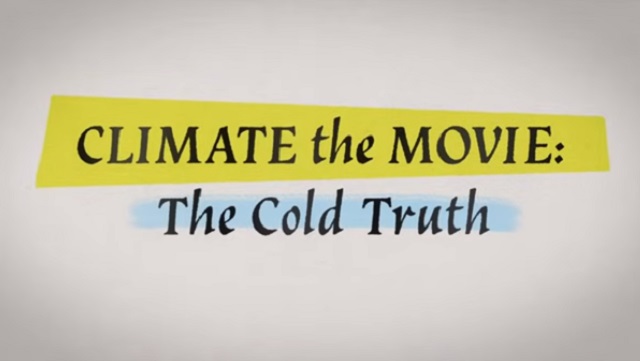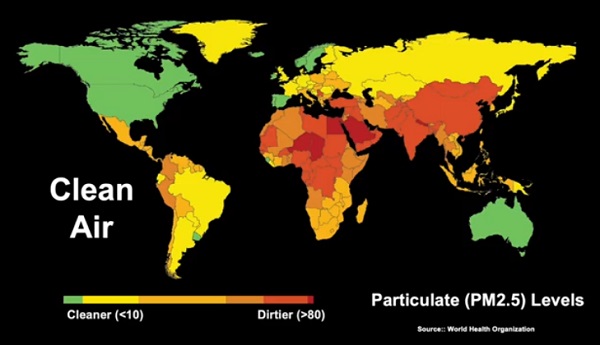Environment
New must-see documentary exposes climate alarm as an “invented scare”

From the Climate Intelligence Foundation (CLINTEL).
Founded in 2019 by emeritus professor of geophysics Guus Berkhout and science journalist Marcel Crok, CLINTEL‘s main objective is to generate knowledge and insight into the extent, nature, causes and consequences of climate change and the climate policy related to it.
From CLINTEL on YouTube
This film exposes the climate alarm as an invented scare without any basis in science. It shows that mainstream studies and official data do not support the claim that we are witnessing an increase in extreme weather events – hurricanes, droughts, heatwaves, wildfires and all the rest. It emphatically counters the claim that current temperatures and levels of atmospheric CO2 are unusually and worryingly high.
The film includes interviews with a number of very prominent scientists, including Professor Steven Koonin (author of ‘Unsettled’, a former provost and vice-president of Caltech), Professor Richard (Dick) Lindzen (formerly professor of meteorology at Harvard and MIT), Professor Will Happer (professor of physics at Princeton), Dr John Clauser (winner of the Nobel prize in Physics in 2022), Professor Nir Shaviv (Racah Institute of Physics), professor Ross McKitrick (University of Guelph), Willie Soon and several others.
The film was written and directed by the British filmmaker Martin Durkin and is the sequel of his excellent 2007 documentary The Great Global Warming Swindle. Tom Nelson, a podcaster who has been deeply examining climate debate issues for the better part of two decades, was the producer of the film.
Follow @ClimateTheMovie and @ClintelOrg for updates.
Climate Intelligence Foundation (CLINTEL) is an independent foundation that reports objectively on climate change and climate policy and aims to be a voice of reason in the often overheated climate debate. CLINTEL was founded in 2019 by emeritus professor of geophysics Guus Berkhout and science journalist Marcel Crok . CLINTEL’s main objective is to generate knowledge and insight into the extent, nature, causes and consequences of climate change and the climate policy related to it. CLINTEL also wants to participate in debates on climate science and policy, as well as in decision-making processes in this regard.
To this end:
- The foundation tries to communicate clearly and transparently to the general public what facts are available about climate change and climate policy and also where facts turn into assumptions and predictions.
- The foundation conducts and encourages a public debate on this matter and carries out investigative journalism work in this area.
- The foundation aims to function as an international meeting place for scientists with different views on climate change and climate policy.
- Will the foundation also conduct or finance scientific research in the field of climate change and climate policy?
- The foundation participates in decision-making procedures regarding the climate, climate communication and climate policy, in particular legislative and regulatory processes, but possibly also legal procedures regarding climate policy of governments, companies or other parties.
CLINTEL wants to take on the role of ‘climate watchdog’, both in the field of climate science and climate policy.
CLINTEL was made possible in part by a start-up donation from real estate entrepreneur Niek Sandmann. The foundation is very grateful to him for this. Several people have already indicated that they would also like to contribute financially to the foundation. This can also be done anonymously if desired. You can support us by becoming a Friend of CLINTEL or making a one-time donation .
The foundation strives for as few overhead costs as possible, so that almost all resources can be spent on investigative journalism, scientific research and public information. CLINTEL will work on an extensive national network of “friends” and “ambassadors”. To this end, meetings ( CLINTEL Chambers ) will be organized throughout the country . CLINTEL also has a youth organization, Young CLINTEL .
CLINTEL is located in Amsterdam and can be reached via [email protected].
Links
Channel details
| www.youtube.com/@clintel628 |
Energy
Affordable Energy: Everything you need to know about energy and the environment

The Dual Challenge: Energy and Environment
Scott Tinker
The world faces two important and interrelated challenges. Affordable and reliable energy for all, and protecting the environment. The energy-environment challenge is not simple, but it is solvable if we understand and address the complex fabric of energy security, scale of energy demand, physics of energy density, distribution of energy resources, interconnectedness of the land, air, water and atmosphere, and the extreme disparity in global wealth and economic health. The truth is that there are no good and bad, clean and dirty, renewable and nonrenewable energy sources. They all have benefits, and they all have challenges. Climate change is an important issue, but it is not the only environmental issue. Solar and wind are important low carbon solutions, but they are only part of the solution. We must put our best minds to the task of addressing the dual challenge, working together to better the world.
Economy
Canadian Natural Gas Exports Could Significantly Reduce Global Emissions

From the Fraser Institute
By Elmira Aliakbari and Julio Mejía
Doubling Canadian natural gas production and exporting to Asia could reduce global emissions by up to 630 million tonnes—nearly as much as Canada produces in a year
Canada could help significantly reduce global greenhouse gas emissions by increasing natural gas production and exporting the additional supply to Asia in the form of liquefied natural gas (LNG), according to a new study from the Fraser Institute, an independent, non-partisan Canadian public policy think tank.
“As countries like China and India continue to burn coal for power, Canadian LNG offers a lower-emission alternative with the potential for major global impact,” said Elmira Aliakbari, director of natural resource studies at the Fraser Institute and coauthor of the study, Exporting Canadian LNG to the World: A Practical Solution for Reducing GHG Emissions
The study estimates the impact from Canada doubling its natural gas production and exporting to Asia to replace coal-fired power. In that scenario, global emissions could drop up to 630 million tonnes annually, which is the equivalent of removing approximately 137 million cars from the road. More specifically, replacing coal-fired power in China with Canadian LNG could cut emissions by up to 62 per cent for every unit of power produced.
“Focusing only on domestic emissions ignores Canada’s potential to support global climate goals,” said Aliakbari. “By displacing coal abroad, Canadian LNG can play a critical role in cutting total global emissions even if domestic emissions were to increase.”
However, regulatory uncertainty and a range of federal and provincial policies continue to hinder LNG development in Canada, despite strong global demand.
“Policymakers need to clear a path if Canada is going to play a meaningful role in reducing global emissions,” Aliakbari added.

Exporting Canadian LNG to the World: A Practical Solution for Reducing GHG Emissions
- Coal, a major source of greenhouse gas (GHG) emissions, remains a leading energy source in many Asian countries, especially China and India. Some European countries have also turned back to coal as sanctions on Russian energy intensified following the invasion of Ukraine.
- As the world seeks practical solutions for reducing greenhouse-gas emissions, natural gas, with its lower carbon footprint, offers a promising alternative to coal.
- With abundant reserve, Canada is well positioned to help reduce global reliance on coal. By exporting Canadian liquified natural gas (LNG) and helping Asian and European countries reduce their reliance on coal, Canada can lower net global GHG emissions.
- Exporting LNG from Canada to China and substituting LNG for coal in the generation of power there can eliminate between 291 and 687 gCO₂eq per kWh of power generated, a reduction of between 34% and 62%.
- If Canada were to double its current natural gas production and export the additional supply to Asia as LNG to displace an equivalent amount of coal used to generate power, global GHG emissions could be reduced by up to 630 million tonnes annually, a significant reduction equivalent to 89% of Canada’s total GHG emissions.
- Canada enjoys several competitive advantages, including cooler temperatures that reduce liquefaction energy costs and a strategic location that offers shorter shipping routes to Europe and Asia compared to many other suppliers.
- Regulatory challenges and a mix of federal and provincial policies, however, have slowed or blocked LNG developments in Canada.







